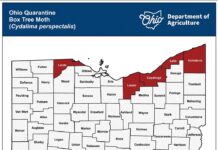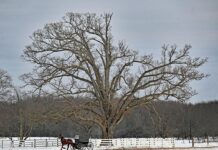SALEM, Ohio — Less than a month after the Ohio Department of Natural Resources postponed a proposal to change coyote trapping and hunting rules, an Ohio state legislator has introduced a bill in response to criticism of the proposal.
The new bill would specify there are no limitation on seasons for hunting or trapping and no permits required to take coyotes. State Rep. Don Jones (R-Freeport) introduced it, March 16.
Proposal
The ODNR’s proposal came in response to a rule review that revealed a conflict in the Ohio Revised Code and the Ohio Administrative Code. The revised code defines coyotes as a fur-bearing animal, which means that people need a fur takers permit to hunt or trap them.
The administrative code, however, provides an exemption for coyotes. The proposal would have essentially removed that exemption, limiting the trapping season for coyotes and requiring fur taker permits for coyote hunters and trappers, to match the revised code.
New bill
The bill Jones introduced would make changes to the revised code. A fur taker permit would not be necessary for trapping and hunting coyotes. It would also add that coyotes can be taken year-round.
Jones proposed the bill after hearing concerns from residents in his district — which includes Carroll, Harrison and Noble counties, and parts of Washington and Belmont counties — about the ODNR’s proposal.
Agriculture
Farmers and agricultural groups, including the Ohio Farm Bureau, were concerned the ODNR’s proposal could cause issues for livestock farmers.
Roger High, the Ohio Farm Bureau’s director of livestock, noted in February that hunting coyotes can be difficult, so trapping is important for farmers who need to keep their coyote population under control. The Ohio Farm Bureau told Farm and Dairy, March 26, it is aware of Jones’ bill and appreciates the attention to the issue.
“The coyote is a predatory animal on livestock,” Jones told Farm and Dairy, March 25. He added that while he appreciates wildlife, he does not believe that coyotes are useful animals, and thinks it is important to keep coyote populations down.
Jones was an agricultural education teacher and FFA adviser for 23 years and comes from a farming family background.
Jones is anticipating push-back, both from animal enthusiasts and from trappers in Ohio, who worry some coyote trappers may be inadvertently catching other animals besides coyotes.
He noted that getting the bill passed will take support from other representatives in other parts of the state and encouraged Ohio residents to call their state representatives if they feel strongly about the bill.
Jones introduced the bill to try to help farmers.
“With prices being low already … the last thing we need to be worried about is farmers losing livestock due to an animal because someone wanted to sell a fur taker permit,” he said.
Permit costs
In addition to farmers’ concerns about the safety of their livestock, some citizens complained about the additional costs getting a fur taker permit would have involved.
“It’s expensive to hunt,” Jones said. “We’re just making it harder on people that are hunting … by charging more fees.”
Jones noted that coyotes are one of the highest-selling hides on the market right now, and people don’t currently have to pay for a fur taker permit. Fur taker permits cost $8 for youth and $15 for adults.
At the Ohio State Trappers Association’s auctions in January, February and March this year, coyote pelts were the second-highest selling item.











Coyote population would control itself if farmers practiced good animal husbandry. Call your co-op extension for appropriate instructions.
Mr. Jones feels “coyotes aren’t useful”? Chilling to know he was an “educator”.
It would be educational if a group of people who are decision makers regarding the hunting of coyotes could read facts about the interface between coyotes and livestock. If they were to read up on the subject they may learn that coyotes are not normally predators of livestock. For instance they could check out the book “Coyote America” by Dan Flores. It is not a book that takes sides. It just presents facts. If you are a decision maker in Ohio you won’t get facts on both sides of the issue as to whether or not coyotes kill livestock if you only listen to people advocating open season on coyotes. But if you read Coyote America you will get a balanced education. Just try to be informed.
When it comes to the natural order of things, coyotes are simply filling in the gap left by the openings left after centuries of killing larger wolves. And coyotes naturally will multiply quickly as the insane killing is allowed to go on unabated. Where is the accountability of farmers and ranchers to employ preventative and non-lethal measures that are less costly than state-sanctioned killing?? I am glad I have chosen the vegetarian option in my life. Man’s lust for blood since his fall from grace in Eden is costing the planet dearly. And now is certainly not the time to promote more killing of the very remedy that is nature as it keeps us all healthy as it was intended…
I fully understand the need of our farmers to protect their livestock. I have raised farm animals myself.
However, today we know all the many benefits a stable (not killed) family of coyotes can bring to our farmers. Today we know that it is best to leave a coyote family in peace, where they can learn where they are and are not welcome. Adequate fencing, shelter and a good guard dog, or large donkey, or llama will do the trick. Coyotes are small; they are not wolves.
In return for not killing your coyotes, they will pay you back 100-fold in rodent patrol and keeping all the other wildlife on your property in a healthy balance; especially the meso-carnivores which are vectors of the rabies virus. Where there is coyote…the chances of a rabies outbreak is very slim; that is their job.
It only takes educating ourselves about how this species works, to have them working FOR us, with significant benefits. And…they also keep vermin out of gardens: porcupine, raccoons, fox and skunk and wood-chuck.
As a former hunter, I am no bleeding heart. Nor am I an “anti.” I have learned about coyotes, the science of them, and I have lived on my own farm for decades with a stable coyote family very successfully.
I encourage you to watch the documentary: The Biggest Little Farm…and also visit this website which is run by a wildlife biologist and carnivore specialist. She can answer any questions you have about coyotes with science behind her…not feelings.
In short..this is the most misunderstood and wrongly maligned animal in North America. I think it’s about time we got out of the Little Red Riding Hood mentality and look to science and good Animal Husbandry practices as the solutions, as we live on a planet that is rapidly changing…we need all the “Keepers of the Balance” that we can get. Especially in the face of viral-based new diseases…another thing coyote will keep at bay.
Sincerely
Claire Perry
http://www.coyotelivesinmaine.org